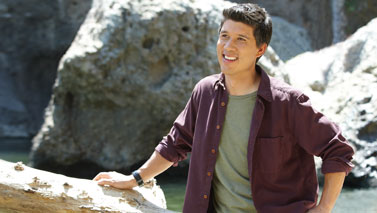Sustainability has become something of a buzzword these days, but to Ted Ning, the concept will always have personal meaning. Having endured a painful period of unsustainability in his own life made it clear to him that sustainability-oriented values must be expressed through everyday action and choice.
Ning, director of LOHAS (Lifestyles of Health and Sustainability), the Boulder, Colo.–based information clearinghouse on sustainable living, recalls spending a tumultuous year in the late ’90s selling insurance. He’d been through the dot-com boom and bust and, desperate for a job, signed on with a Boulder agency.
It didn’t go well. “It was a really bad move because that’s not my passion,” says Ning, whose ambivalence about the job translated, predictably, into a lack of sales. “I was miserable. I had so much anxiety that I would pull alongside of the highway and vomit, or wake up in the middle of the night and stare at the ceiling. I had no money and needed the job. Everyone said, ‘Just wait, you’ll turn the corner, give it some time.’”
Ning stuck it out for a year because he simply didn’t know what else to do, but felt his happiness and health suffer as a result. He eventually quit and stumbled upon LOHAS in a help-wanted ad for a data analyst. “I didn’t know what LOHAS was,” he says, “but it sounded kinda neat.” It turned out to be a better fit than he could have ever imagined.
At the time, the LOHAS organization did little more than host a small annual conference in Boulder. It was a forum where progressive-minded companies could gather to compare notes on how to reach a values-driven segment of consumers — the LOHAS market — who seemed attracted to products and services that mirrored their interest in health, environmental stewardship, social justice, personal development and sustainable living.
In contrast with his disastrous foray into the insurance business, Ning’s new job felt like coming home. Growing up in the foothills of the Rockies outside of Denver, he’d developed a love of the outdoors and a respect for the earth, while his parents provided a model of social activism — the family traveled widely, and at one point his parents created and operated a nonprofit that offered microcredit loans to small businesses in Vietnam and Guatemala. He has three adopted sisters from Vietnam and Korea. He studied international relations and Chinese at Colorado University and slipped easily into the Boulder lifestyle — commuting by bike, eating organics, buying local and the rest — though he stopped short of the patchouli-and-dreadlocks phase embraced by many of his peers. (He opted instead for the university’s ski team and, after graduating, wound up coaching the Japanese development team during the Nagano Olympics in 1998.)
From his ground-level job, Ning moved quickly up the ranks in the organization, becoming its executive director in 2006. “When I got the job, LOHAS was a sleepy conference in Boulder,” says Ning. Today, the forum is booming, the organization is expanding and the market is evolving. Ning has more than grown into the position he stumbled on in the want ads. “I don’t consider this a job. It is really more of a calling.”
Ning, 41, coordinates the conference and oversees the organization’s annual journal and Web site (www.lohas.com), while compiling research on trends and opportunities for businesses. He also travels the country promoting — and explaining — the LOHAS concept and the burgeoning market it represents.
First identified by sociologist Paul Ray in the mid-1990s as “cultural creatives,” the U.S. market segment that embraces LOHAS today has grown to about 41 million consumers, or roughly 19 percent of American adults. But those LOHAS consumers are powerfully influencing the attitudes and behaviors of others (witness the rise of interest in yoga, all-natural products, simplicity and hybrid vehicles). Which is why LOHAS-related products now generate an estimated $209 billion annually.
“Over the last two years a green tidal wave has come over us,” says Ning. Riding that wave, says Ning, is not about jumping on a trend bandwagon. It’s connecting with — and acting on — a set of shared, instrinsic values. “People know what is authentic. You can’t preach this lifestyle and not live it,” he says. He and his wife, Jenifer, live in a solar-powered home, raise organic vegetables in their backyard and drive a car that gets 48 miles to the gallon. He even buys carbon offsets to negate the global warming impact of his cell phone.
Ning emphasizes that there are many different ways of “living LOHAS.” Ultimately, it’s really about finding a way of life that makes sense and feels good — now and for the long haul. “People are looking internally,” he says, “asking themselves, ‘What really makes me happy?’ Is it the fact that I can go out and buy that giant flat-screen TV, or is it that I can have a quiet evening with my family just hanging out and playing a game of Scrabble?”
For Ning, it’s a no-brainer. He’ll take Scrabble every time.
Go behind the scenes at our cover shoot with Ted Ning at experiencelife.lifetime.life/videos.


This Post Has 0 Comments